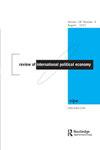Hierarchy and differentiation in international regime complexes: a theoretical framework for comparative research
IF 3.5
1区 经济学
Q1 ECONOMICS
引用次数: 23
Abstract
The concept of international regime complexity offers a useful lens for examining the increasing density of international institutions in global governance. A growing literature in International Political Economy (IPE) identifies clusters of overlapping institutions in many important policy areas, yet some scholars argue that complexity undermines governance effectiveness, while others perceive distinct advantages over unified institutions. To bring coherence to these findings, we present a general theoretical framework that characterizes regime complexes based on two structural features: Authority relations and institutional differentiation. These dimensions jointly determine the opportunities and constraints that states and other actors confront as they navigate institutional rules. As a result, they shape important outcomes, such as policy adjustment, regime shifting and competitive regime creation. The article proposes testable hypotheses regarding the effects of authority and differentiation, and we assess their correspondence with the eight regime complexes examined by the five companion articles in this special issue. We further identify a set of dynamic processes that shape the evolution of regime complexes over time. Our framework strengthens the foundation for comparative analysis of regime complexes and charts a new agenda for the research program.国际制度复合体中的等级与分化:一个比较研究的理论框架
国际制度复杂性的概念为审视全球治理中日益密集的国际机构提供了一个有用的视角。国际政治经济学(IPE)中越来越多的文献指出,在许多重要的政策领域,重叠的制度集群会削弱治理的有效性,但一些学者认为,复杂性会破坏治理的有效性,而另一些学者则认为,相对于统一的制度,复杂性具有明显的优势。为了使这些发现具有连贯性,我们提出了一个一般性的理论框架,该框架基于两个结构特征来表征政权综合体:权威关系和制度分化。这些维度共同决定了国家和其他行为体在驾驭制度规则时面临的机遇和制约。因此,它们塑造了重要的结果,如政策调整、制度转移和竞争性制度的建立。本文提出了关于权威和分化的影响的可检验的假设,我们评估了它们与本期特刊中五篇配套文章所研究的八个制度复合体的对应关系。我们进一步确定了一组动态过程,这些过程塑造了政权复合物随时间的演变。我们的框架加强了制度复合体比较分析的基础,并为研究计划制定了新的议程。
本文章由计算机程序翻译,如有差异,请以英文原文为准。
求助全文
约1分钟内获得全文
求助全文
来源期刊
CiteScore
9.20
自引率
9.30%
发文量
47
期刊介绍:
The Review of Political Economy is a peer-reviewed journal welcoming constructive and critical contributions in all areas of political economy, including the Austrian, Behavioral Economics, Feminist Economics, Institutionalist, Marxian, Post Keynesian, and Sraffian traditions. The Review publishes both theoretical and empirical research, and is also open to submissions in methodology, economic history and the history of economic thought that cast light on issues of contemporary relevance in political economy. Comments on articles published in the Review are encouraged.

 求助内容:
求助内容: 应助结果提醒方式:
应助结果提醒方式:


